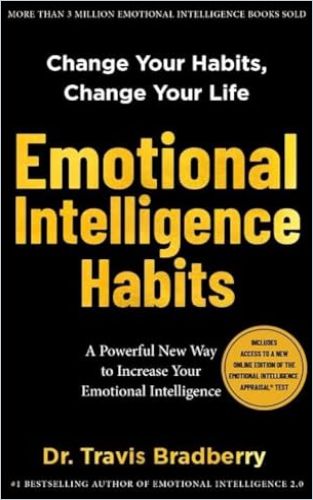Travis Bradberry, PhD, co-author of the bestseller, Emotional Intelligence 2.0., provides tools to increase your EQ and improve your relationship with yourself and others.

Greater Self-Awareness
Author Travis Bradberry promises that you can develop your emotional intelligence (EQ) and improve your personal and professional life. He designed his book to equip you to increase your EQ, build self-confidence, and relate better to others, and he makes you believe in your potential to execute those changes. This is Bradberry’s second work on emotional intelligence; he co-authored the 2009 bestseller Emotional Intelligence 2.0.
Emotional Intelligence (EQ)
Your senses take in information, basically sending electric signals to your brain. Before reaching your prefrontal cortex, these signals pass through your emotion generating limbic system. You can’t control which emotions arise, but Bradberry teaches that you can learn how to react to them and then manage them. This requires identifying your feelings and coming to know – based on your history – which “trigger events” can cause you to have longer, stronger, harder to manage emotional reactions.
When you suffer anxiety or stress, your body reduces the amount of energy it sends to your immune system. Bradberry reports that recovering cancer and heart attack patients who learn EQ skills enjoy better health outcomes than those who don’t receive EQ training. People who learn to deal with their emotions also experience lower stress, eat more healthfully, and positively reframe their thoughts about stressful situations.
Emotional intelligence includes both personal and social competencies that affect how you handle yourself and your relationships. Personal competency requires self-awareness, which enables you to identify an emotion instantly and shift your knee-jerk reaction from possibly negative feelings to more beneficial ones.Whether a difficult person, problem, or situation provokes you, self-awareness enables you to think rationally before you overreact.
A high degree of self-awareness requires a willingness to tolerate the discomfort of focusing on feelings that may be difficult to acknowledge.
Travis Bradberry
Bradberry assures you that you can learn social competence, the ability to manage your reactions toward people and situations. To prevent your feelings and reactions from emotionally hijacking you, he advises naming each emotion as it arises and consciously recognizing how it affects your behavior.
Your reactions in a specific situation – such as showing irritation toward an annoying person – may be relatively easy for you to identify and manage.However, developing the habit of suppressing or redirecting your initial reactions repeatedly to achieve a longer-term goal of emotional intelligence is more difficult.
Relationship management calls for mustering your EQ so you can govern your emotions and ensure successful interactions. This is harder when you are stressed. Because most people don’t handle stress well, they tend to have difficulties communicating their needs and dealing productively with conflict. Thus, it is hardest to maintain your EQ – and your personal and social competence – after the newness of a job, relationship, or friendship wears off and your habitual – and less self-aware – responses to emotional stimuli reassert themselves.
High EQ achievements
People with a higher EQ consciously identify their feelings, strengths, and weaknesses. They understand that “unlabeled emotions” can impede rational decision-making. They know which environments they thrive in and which ones challenge their equilibrium.
High EQ people have a well-developed sense of social awareness that enables them to read other people, understand their character, and recognize their motivations. They remain flexible and able to adapt to change instead of fearing the future. They know when they’ve erred and when to try to correct their mistakes.
Emotional intelligence requires effective communication between the rational and emotional centers of your brain.
Travis Bradberry
High EQ people balance kindness with setting boundaries and asserting themselves. They can stay on an even keel, which helps them cope with toxic people without turning those people into enemies.
In contrast, low EQ people tend to misread social cues and then claim that others misunderstood them. They seldom take ownership of their emotions; instead, they blame others for causing them to feel a certain way. They find it difficult to identify their emotional triggers or to stop themselves from acting impulsively.
However, Bradberry reassures those who can acknowledge that their EQ is poor that they can build it up by identifying and conquering habits that impede them from achieving their interpersonal goals.
Cultivating EQ
As you establish new or better habits, your brain builds new pathways to reinforce them. If you usually yell when you’re angry, and you work to change that, your reflex to react to irritation by shouting will steadily diminish until it goes away. As you learn to deal with stress, your confidence, happiness, self-control, and likeability will increase. The same new habits can improve your leadership skills, motivation, productivity, and ability to communicate at work and at home.
To relieve stress, Bradberry explains, acknowledge that it’s never worthwhile to worry about something beyond your control. When problems arise, finding reasons to be grateful can help you avoid the trap of irrational negativity and can boost your serotonin and dopamine levels. When you feel down, deliberately identify your negative emotions to move your brain to engage your prefrontal cortex. Worrying, blaming others, isolating yourself, and devolving to endlessly scanning through your phone will only exacerbate your unhappiness.
Applying EQ skills at work will make you a better, more sought-after leader. When problems occur, high EQ leaders understand the strengths and weaknesses of their team members, look for solutions, and embrace forward action. They are self-aware and compassionate.
Great leadership is dynamic; it melds a variety of unique skills into an integrated whole.
Travis Bradberry
Learning to manage your emotions boosts your ability to support and influence other people. This enables you to become a better leader who can balance the needs of your team with those of your organization. Leaders with high EQ shun bullying, weakness, arrogance, or illusion, and treat their people with strength, kindness, confidence, and positivity.
Shaping Yourself
Travis Bradberry highlights how and why you might develop faulty emotional habits and explains how to change them. He advises working on self-awareness first in a single, high priority emotional area, integrating a more positive habit, and then tackling other areas. To shape your reactions, Bradberry says, identify an emotion, ask yourself why you feel it, and consider what triggers it. Then, with work, you can change your habits and your brain. Bradberry sincerely believes in his methodology; he writes clearly, though he may repeat himself now and then to reinforce a point. Those who would like to develop a more even-keeled emotional life and function more effectively at work and at home will benefit from his guidance.





